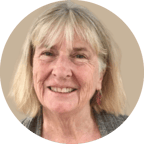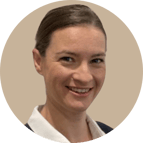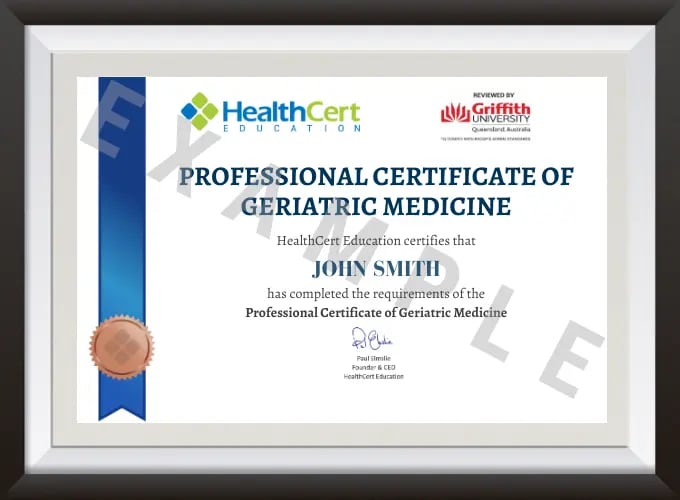Anal-rectal conditions are a frequent part of general practice, yet many GPs feel less confident...
.jpg?height=200&name=HCE%20HubSpot%20blog%20images%20600x350%20(50).jpg)
Learn to recognise clinical health changes in older patients to improve opportunities for prevention and early treatment.

GPs are often ideally placed to focus on prevention and early-stage identification of chronic health problems in older patients — a common presentation in general practice. Leverage your knowledge of patients' social context and medical history to deliver high-quality primary care to your patients aged 65+.
- Effectively manage age-related health issues of the growing ageing population.
- Address the complex medical needs of geriatric patients who often present with multiple comorbidities.
- Provide comprehensive care that enhances your patients' quality of life and social, psychological, and functional wellbeing.
- This course is for medical doctors, International Medical Graduates, registered nurses, and degree-qualified health professionals.
- CPD-accredited and university-reviewed.
Fulfils 50 hrs for medical professionals in Australia*
100% online
$1595
Special rates available
85 hrs
Self-paced
*provided an outcome measurement activity with a minimum of 5 hours is completed.

- Meet patient demand, as people aged 65+ account for 20 per cent of presentations to emergency departments and nine per cent of hospital admissions in Australia.
- Diagnose and manage patients with dementia, osteoporosis, and depression.
- Safeguard elderly patients by screening them for risk of falls and fractures.
- Manage polypharmacy in elderly patients and assist with medication management.
This module commences with the statistics and clinical significance of dementia. Common dementia diseases outlined include Alzheimer’s disease, Lewy body dementia, vascular dementia, frontotemporal dementia and younger onset dementia. Diagnosis information including history, early signs and symptoms, other cognitive impairment causes and inclusion/exclusion criteria are outlined. Examination options include observations, bedside tests, cardiovascular, neuro and mental health. Pathology and imaging options are discussed including screening tools and their advantages and disadvantages. The module then moves to the benefits of early diagnosis and concludes with applying the module learning to three case studies.
This module commences with the definition and statistics for falls in the elderly. Risk and prevention factors at both the community and individual level are considered. Predictors for fall risk include increasing age, history of falls, abnormal gait or balance and polypharmacy. Validated falls risk screening tools are discussed that lead to assessment and implementation of a management plan to reduce risk of falls and fall related injuries. As part of the assessment process, history, examination, intrinsic and extrinsic factors risk factors, home assessment and appropriate investigations support the development of a management plan. Medications that may increase falls risk are listed together with falls reduction programs for the patient and also for the clinical setting.
This module begins with describing polypharmacy and the health considerations for medications in persons over 65 years. Inappropriate prescribing and over the counter medications puts elder patients at the risk of adverse drug reactions. The physiological changes in the elderly are outlined. The number of people being prescribed multiple treatments is rising and a suggested systematic approach to prescribing new medications and regular medication reviews are outlined, including a systematic approach to deprescribing. Factors to consider before prescribing a new medication include determining the goals of treatment, patient values/preferences, medications known to increase the likelihood of a prescribing cascade occurring and medication interactions. The process of Domiciliary Medication Management Reviews (DMMR) is outlined. The approach to deprescribing, including barriers, tapering of medications and medications commonly associated with adverse events are provided. The module concludes with key take home points.
This module commences by describing osteoporosis and related statistics. Bone physiology and determinants of bone density are revisited and modifiable risk factors outlined. Fracture risk factors independent of Bone mineral density (BMD) are outlined and two calculators for assessing fracture risk are included. Recommendations for identifying patients to investigate for osteoporosis and bone mineral density testing are outlined. The management of osteoporosis is discussed from a non-pharmacological, lifestyle and pharmacological perspective. The module then discusses osteoporosis in men including risk factors. The module concludes with focusing on osteoporosis in young people including chronic diseases associated with lowered BMD, assessment and the principles of treatment of osteoporosis in children and adolescents.
This module begins with describing palliative care, care providers and patients eligible for palliative care. It focusses on the medical practitioner role including breaking the news, how the patient may feel, cultural awareness, goals of care and having the difficult conversations. Pain assessment is discussed including diagnostic tools, types of pain and managing pain by both non-pharmacological and pharmacological methods. Options of pain management are discussed including working through a case study. The module then moves to symptom management of the gastrointestinal tract including nausea and vomiting, constipation and bowel obstruction. The module concludes with further symptom management including dyspnoea, fatigue, mood and anxiety, including dosage and delivery modes.
This module begins with an overview of depression and the increasing higher levels of psychological distress for older people. The content includes information on understanding depression, depression categories and how the medical profession defines depression. It then moves to the causes of depression, risk factors for the elderly, and other causal factors including at-risk groups. The effects of depression and how they may be displayed are mentioned, then considers diagnostic information, screening and assessment tools. Assessing suicide risk, differential considerations and investigations are outlined. The GP Mental health Care Plan and treatment approach includes education, lifestyle changes, psychological and medication considerations. The module concludes with two clinical case studies.
This module commences with the causes and effect of malnutrition in the elderly. Included are the physiological effects of ageing on the gastrointestinal system and other clinical manifestations including anorexia. Understanding undernutrition in the elderly includes screening assessment tools and information on management techniques. Undernutrition is also often associated with people with dementia. The module then moves to obesity in the elderly including sarcopenic obesity. Approaches to weight loss in the elderly are included. The module concludes with an overview and guidelines of nutrient requirements in the elderly.
The elderly are more likely to have complex and multiple health care needs and problems. The medical practitioner’s role in caring for the elderly considers family and other carer relationships and medical legal practicalities. This includes communicating with carers, recognising carer stress and when to recommend respite care. Complexities and options for caring for the elderly in the community including government subsidised services like the Commonwealth Home Support Programme and Home Care Packages. Transition, respite care and mental health care information is included together with information on retirement villages and supported accommodation options. The module then moves to how to apply for residential aged care facilities (RACF), ACAT assessments and considerations to achieving residential aged care. Services are discussed together with the transition process to supported accommodation. The module concludes with information on the medical practitioner role in providing care to residents in RACFs and includes Medicare information.

Director, MONARC (Monash Ageing Research Centre), Monash University
Head, Academic Unit of Geriatric Medicine, MONARC, Monash University
Professor of Geriatric Medicine, Monash University
Medical Director, Rehabilitation and Aged Care Services, Monash Health (Retired March 2021)
The Professional Certificate of Geriatric Medicine has been independently reviewed by Professor Barbara Workman, Medical Director (Rehabilitation and Aged Care Services) at Monash Health. Formerly, Prof Workman was a Professor of Geriatric Medicine at Monash University.

Certificate of Family Planning, Graduate Diploma of Medical Education
Associate Professor Debbie Kors is the founder and joint owner of a private teaching general practice in Port Macquarie, Australia. She works there as a general practitioner and GP supervisor of GP registrars and medical students.
A/Prof Kors is a passionate advocate for the profession of general practice. She is a Conjoint Associate Professor in Primary Health Care at the UNSW Rural Clinical School, Port Macquarie campus and has previously worked as a senior medical educator with North Coast GP Training. In 2010, she was nominated for and won the General Practice Education and Training GP Supervisor of the Year award.
A/Prof Kors holds a MBBS (first class honours), Fellowship of the RACGP, Masters of Family Medicine (clinical), Diploma of the Royal Australian College of Obstetricians and Gynaecologists, Graduate Diploma of Medical Education and a Certificate of Family Planning.

Dr Christine Ahern has worked as a general practitioner in rural NSW since 1983, often with Aboriginal and Torres Strait Islander communities. Her special interests include women’s health and education.
Dr Ahern is a senior lecturer at Sydney University and has previously been the Director of Training for North Coast GP Training. In 2011 she was named the General Practice Education and Training Medical Educator of the Year, a prestigious national award. Dr Ahern holds a MBBS and FRACGP.

Dr Evangelia (Valia) Francis enjoys all aspects of General Practice but is especially interested in skin medicine, women's health and medicine of the elderly.
Originally from the coastal town of Kavala in Greece, Dr Francis is involved in teaching medical students as a Conjoint Lecturer in the Rural Medical School of Port Macquarie as well as teaching registrars. It is a very fulfilling aspect of her work that has been greatly inspired and supported by the senior educators at her practice.
When not at work, Dr Francis tries to fight waves with surf or paddle boards (so far they always win!), is training hard to become the next MasterChef winner, and enjoys reading books and learning new languages.


General practitioner
Dr Elizabeth Ryrie is a practising clinician working fulltime in general practice in Port Macquarie, NSW. She completed her medical studies at the Australian National University in 2012 after an undergraduate degree at The University of Sydney. She spent her years as a junior doctor in Canberra, also completing a Diploma in Child Health during this time. She moved to the NSW Mid North Coast in 2015 to undergo her general practice training.
Dr Ryrie enjoys the variety and continuity of care that general practice offers. She is particularly interested in paediatrics, women’s health and palliative care.

$1595
*provided an outcome measurement activity with a minimum of 5 hours is completed.
Bundle two courses and save 5%, or three courses and save 10% upon enrolment.
Talk to us about deferred payment options, registrar scholarships and special rates.
*For Australian residents only: Online course prices are shown exclusive of GST. If you are GST-registered, please enter a valid ABN at checkout to ensure GST is not applied. Otherwise, 10% GST will be added at checkout. View our FAQ for more information.


HealthCert courses have become the standard by which you gauge all others.
Dr K. Abolarinwa
Good courses with excellent speakers. I particularly enjoyed the case study scenarios which helped to integrate the knowledge gained.
Dr A. Tucker
This is the pathway to improve your confidence and evolve into the GP you aspire to be.
Dr S. Shinwari
| RACGP Activity Number | ACRRM Activity Number | Activity Title | Education Hours | Performance Hours | Outcome Hours | ||
|---|---|---|---|---|---|---|---|
| 447539 | 31107SM | Aged care services and residential aged care | 447539 | 31107SM | 5 | 6 | 0 |
| 447501 | 31103 | Osteoporosis | 447501 | 31103 | 4 | 6 | 0 |
| 447518 | 31105 | Depression in the Elderly | 447518 | 31105 | 6 | 6 | 0 |
| 447511 | 31104 | Palliative care – the essentials | 447511 | 31104 | 5 | 6 | 0 |
| 447487 | 31102 | Polypharmacy and how to manage it | 447487 | 31102 | 4 | 6 | 0 |
| 447459 | 31100 | Diagnosing Dementia | 447459 | 31100 | 5 | 6 | 0 |
| 447473 | 31101 | Falls in the Elderly | 447473 | 31101 | 4 | 6 | 0 |
| 447527 | 31106 | Nutrition in the Elderly | 447527 | 31106 | 4 | 6 | 0 |
| 802644 | 32985 | Osteoporosis Outcome Improvement Activity | 802644 | 32985 | 0 | 0 | 8.5 |
| Total hours | 37 | 48 | 8.5 | ||||
View the CPD Hours for all HealthCert Education activities.
The purpose of outcome measurement activities is to improve your clinical confidence in managing an identified learning gap. Outcome measurement activities are not a requirement of our Professional Certificate of Advanced Certificate courses; they are a requirement for Australian CPD purposes.
HealthCert Education provides a variety of outcome measurements activities to suit your needs:
The Professional Certificate of Geriatric Medicine is tailored for medical professionals who wish to learn how to improve outcomes for elderly patients seen in general practice.
This qualification is the first stage of the Professional Diploma of Geriatric Medicine. There are no prerequisites.
Participants do not have to pass an IELTS test but, as the courses are delivered in English, proficiency in listening, reading and writing English is assumed.
Participants will require access to a computer/laptop, an internet connection and a basic level of technology proficiency to access and navigate the online learning portal.
Professionally recognised qualifications and prior studies may be recognised for entry into this course if the learning outcomes match exactly. Please ask a HealthCert Education Advisor for an individual assessment of your prior qualifications and experience.
This certificate course meets the minimum 50 hours CPD annual requirement across all three mandatory CPD activity types, provided an outcome measurement activity with a minimum of five hours is completed. You may use an optional HealthCert outcome measurement activity or develop your own.
Outcome measurement activities are not a requirement of Professional or Advanced Certificates.
Upon successful completion of the course requirements, course participants will receive the Professional Certificate of Geriatric Medicine and CPD hours.
This certificate course:
To learn more about the delivery of certificates in Australia and overseas, please visit our FAQs.
Professional Diploma Pathway
This course is the first stage of the three-part professional diploma pathway. The full pathway is: Professional Certificate of Geriatric Medicine, Advanced Certificate of Geriatric Medicine, Professional Diploma of Geriatric Medicine.
This organisation is an RACGP-accredited CPD provider under the RACGP CPD Program.




Don't see your question? Explore other faqs or talk to us.
Fees will vary based on the program and study option selected (fully online vs online + optional practical workshop). Payments can be made upfront or in monthly instalments. Special rates and various payment options are available. GP registrars and doctors in training enjoy a scholarship of up to $500. Talk to us to learn more.
Completion of any HealthCert course or attendance at an event will enable you to access the HealthCert Alumni Program which includes:
HealthCert Education is pleased to issue digital credentials for alumni. Digital credentials are a permanent online record of your successful completion of a HealthCert course and are issued to all course participants in addition to PDF certificates. If you are based in Australia, you also have the option to order a hard copy of your digital certificate for a small additional fee.
The recommended study duration of this certificate course is 85 hours, which includes study of the pre-course activities and readings, online lectures, live tutorials, and online assessment. This self-paced course offers the flexibility of 100% online study in your own time, at your own pace, in your own home or office, with no mandatory face-to-face requirements. You are not required to be online at specific times but can view and replay video lectures at your convenience.
All HealthCert courses meet World Federation of Medical Education standards. This certificate course qualifies for CPD hours from the Royal Australian College of General Practitioners (RACGP) and the Australian College of Rural and Remote Medicine (ACRRM) in Australia. It is recognised by the Royal New Zealand College of General Practitioners (RNZCGP) in New Zealand. It is recognised by the Hong Kong College of Family Physicians (HKCFP) in China. It is a self-submitted activity in Dubai and the United Kingdom. It is a self-submitted activity through the College of Family Physicians in Canada. If you live or work outside one of the above-mentioned countries, please contact us on admin@healthcert.com to discuss whether this course can be recognised in your country.
Want to stay up-to-date with the latest case studies, podcasts, free video tutorials and medical research articles pertinent to primary care?
Our Education Advisors can assist you with any queries and tailor our education pathway to suit your current expertise, interests and career goals.